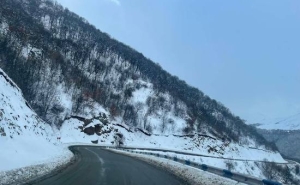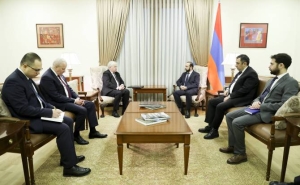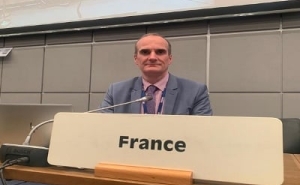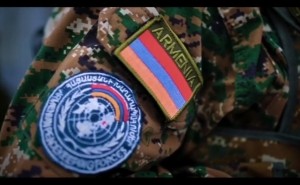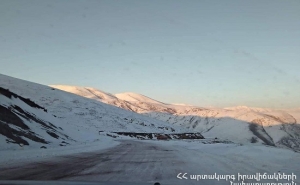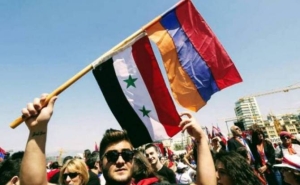PACE winter session to present report on Armenian-Azerbaijani relations in 2022

A report on Armenian-Azerbaijani relations in 2022 will be presented at PACE Winter Session, News.am reports.
The winter session of PACE will be held in Strasbourg from 23 to 27 January.
According to the report published on PACE's official website, the PACE will examine tensions between the two countries.
"The rapporteurs on Armenia (Mr Kimmo Kiljunen, Finland, SOC, and Ms Boriana Åberg, Sweden, EPP/CD) and on Azerbaijan (Mr Ian Liddell-Grainger, United Kingdom, EC/DA, and Ms Lise Christoffersen, Norway, SOC) continued to follow closely the developments concerning relations between the two countries including regarding (the question of) Nagorno Karabakh," the report authors note.
PACE also provided a list of events in Armenian-Azerbaijani relations in 2022:
On January 11, 2022, hostilities resumed on the Armenian-Azerbaijani border, in which three Armenians and one Azerbaijani soldier were reportedly killed.
The implementation of the trilateral statements of January 11, 2021 and November 9-10, 2020 was called into question. At the same time, the official mediation mechanism, the OSCE Minsk Group, co-chaired by Russia, the U.S. and France, seemed to have reached an impasse. As a result, parallel mediation efforts were undertaken by Russia, the European Union, and the United States.
Online talks between Prime Minister Pashinyan and President Aliyev took place on February 4.
The talks were attended by French President Emmanuel Macron and European Council President Charles Michel to facilitate peace talks.
On March 8, a pipeline supplying gas from Armenia to Nagorno-Karabakh was damaged in a section located in the territory under Azerbaijani control after the war of 2020.
This led to a cut in gas supplies to the people of Nagorno-Karabakh. Azerbaijan did not allow Armenia access to the damaged section of the pipeline and, after 10 days of negotiations, repaired the pipeline itself. A week later, on March 24, the ceasefire in the region was broken when Azerbaijani forces advanced into the zone of responsibility of Russian peacekeepers.
On 8 April and 23 May, two further meetings between President Aliyev and Prime Minister Pashinian were held in Brussels, in the presence of European Council President Charles Michel.
A bilateral commission on border delineation and demarcation was set up, but no concrete results have been achieved.
On July 30, cease-fire violations were reported in the Nagorno-Karabakh region and on the internationally recognized border between Armenia and Azerbaijan.
On August 2, a Russian peacekeeping mission confirmed that Azerbaijan violated the ceasefire several times.
Both Armenia and Azerbaijan expressed dissatisfaction with the implementation of trilateral statements. Azerbaijan demanded the full withdrawal of Armenian forces from Nagorno-Karabakh; completion of a corridor under its control to link mainland Azerbaijan to the Nakhichevan enclave; and construction of a new road to replace the Lachin corridor between Armenia and Nagorno-Karabakh.
A fourth meeting between President Aliyev and Prime Minister Pashinian was held in Brussels on August 31, mediated by the president of the European Council.
Some progress was made, as it was agreed to discuss the text of a peace treaty within a month; to resolve humanitarian issues; to hold a border delimitation commission meeting in Brussels in November; and to unblock transportation routes.
On September 12, 13 and 14, 2022, new large-scale hostilities began along the Armenian-Azerbaijani border.
Azerbaijani armed forces conducted an offensive across the border and advanced into internationally recognized Armenian territory, including artillery strikes and the use of drones, striking targets on Armenian territory, while claiming that the clashes began after "large-scale provocations" from the Armenian side.
A ceasefire agreement was reached, but it was the most serious escalation since 2020; 200 Armenian soldiers and 80 Azerbaijani soldiers were killed, and more than 7,500 Armenian civilians were forced to flee their homes.
On October 6 and 7, a two-round meeting between President Aliyev and Prime Minister Pashinyan was held in Prague, mediated by the European Union and France.
A statement was adopted in which, for the first time, Azerbaijan and Armenia mutually recognized each other's territorial integrity. It was decided that a European Union civilian mission would patrol the Armenian-Azerbaijani border for two months to help reduce tensions and assist the Border Delimitation Commission.
On October 10, at the initiative of the Monitoring Committee, the Assembly held a debate on current issues on military action between Azerbaijan and Armenia, including strikes on populated areas and civilian infrastructure.
On October 13, the co-rapporteurs on Armenia issued a statement calling on the Azerbaijani authorities to immediately withdraw troops from all parts of Armenian territory and release prisoners of war under their control.
On November 1, Presidents Putin and Aliyev and Prime Minister Pashinyan held their fourth trilateral meeting in Sochi.
In a final trilateral statement, Armenia and Azerbaijan reaffirmed their commitment to refrain from the use or threat of force and agreed to discuss and resolve all problematic issues exclusively on the basis of mutual recognition of sovereignty, territorial integrity and the inviolability of borders, in accordance with the UN Charter and the 1991 Alma-Ata Declaration.
-
 17:08
17:08The regular session of the Anti-corruption Policy Council takes place in Jermuk
-
 15:05
15:05The Prime Minister sends congratulatory messages to the supreme leader of Iran and the President of Iran
-
 11:11
11:11Armenia sends earthquake aid to Turkey
-
 10:43
10:43Commemoration of the Pontiff St. Sahak Partev
-
 09:16
09:16Some roads are closed and difficult to pass in Armenia
-
 19:55
19:55Phone conversation of the Foreign Minister of Armenia with the U.S. Assistant Secretary of State for European and Eurasian Affairs
-
 18:30
18:30Prime Minister Pashinyan and President Khachaturyan meet
-
 18:20
18:20Ararat Mirzoyan with Co-Chairman of the OSCE Minsk Group of France Brice Roquefeuil
-
 17:01
17:01Humans could land on Mars within 10 years, Musk predicts
-
 16:45
16:45France, US urge 'immediate' end to Nagorno Karabakh blockade
-
 16:01
16:01Blockaded Nagorno Karabakh launches fundraiser to support quake-hit Syria
-
 15:59
15:59Earthquake death toll in Turkey rises to 18,342
-
 15:43
15:43Ararat Mirzoyan Held a Telephone Conversation with Sergey Lavrov
-
 15:06
15:06French president rules out fighter jet supplies to Ukraine in near future
-
 14:47
14:475 Day Weather Forecast in Armenia
-
 14:44
14:44President Vahagn Khachaturyan wrote a note in the book of condolences opened in the Embassy of Syria in Armenia
-
 14:20
14:20Azerbaijan’s provocations impede establishment of peace and stability – Armenian FM tells Russian Co-Chair of OSCE MG
-
 12:57
12:57France representation to OSCE: Paris calls on Azerbaijan to restore freedom of movement through Lachin corridor
-
 11:40
11:40Command of Kosovo forces highly appreciated preparation of Armenian peacekeepers
-
 10:16
10:16The United States withdrew from sanctions against Syria for six months the provision of assistance after the earthquake
day
week
month
Humidity: %
Wind: km/h


